The 16th London Spanish Film Festival is here
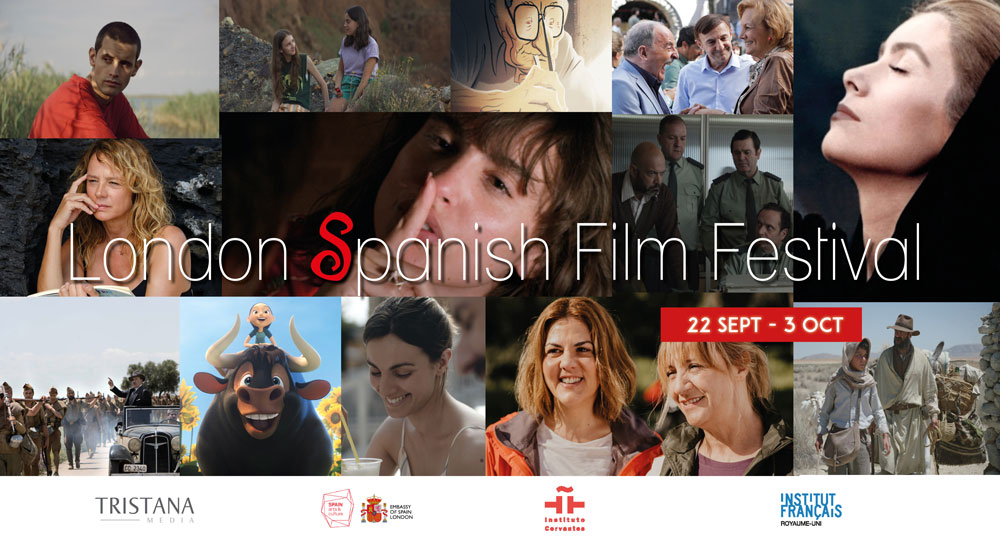
The London Spanish Film Festival, now in its 16th edition, comes again to Ciné Lumière, from September 22nd to October 3rd, with an exciting selection of some of the best films made in Spain.
Most of the films are UK premieres and probably your only chance to watch them! Thecore program and Basque and Catalan Windows offer a variety of films covering many genres and showing the wealth of talent Spain has to offer.
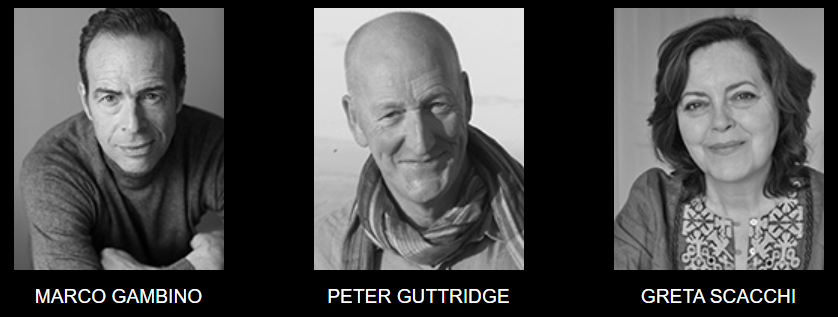
This year the Jury who will award the Best Film prize is formed by Greta Scacchi, Peter Guttridge and Marco Gambino.
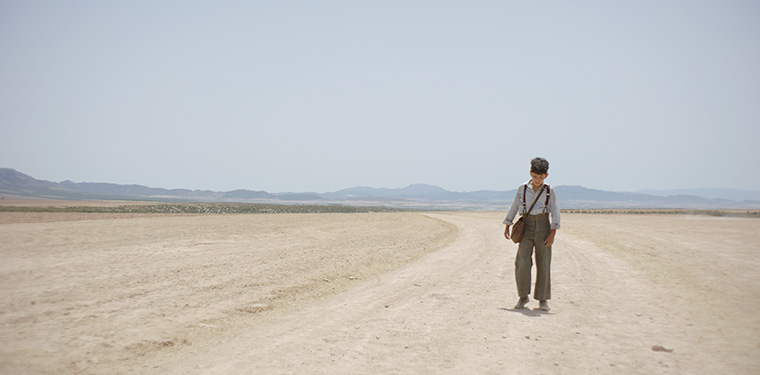
Don’t miss the chance to watch Out in the Open, directed by Benito Zambrano is a breath-taking thriller, gorgeously-shot Western, boasting the stunning cinematography of Pau Esteve Birba.
A boy runs away from home, dashing through the heartlands. Leaving his penniless family behind him, he is desperate to reach the city and earn a living. But his pursuers are giving chase… Out in the open, he finds a shepherd who offers protection, a mysterious man who spent many years in Morocco before the Civil War.
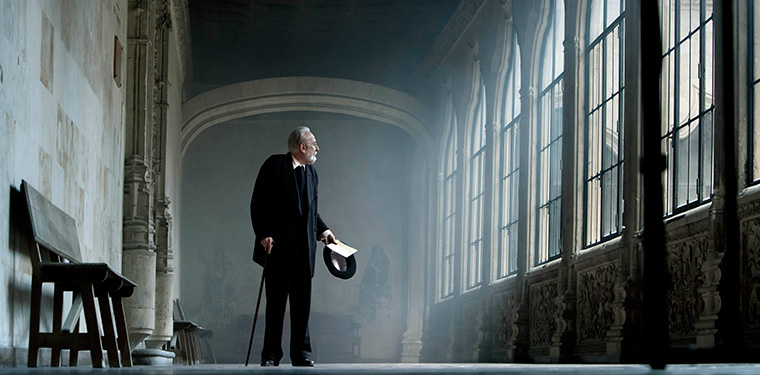
Highlights include While at War by Academy Award winner Alejandro Amenábar, his seventh feature film, which takes us back to the days of the Spanish Civil War outbreak and Miguel de Unamuno’s fight in Salamanca against everyone to stand for what he believed was right.
Not just another Spanish Civil War film, While at War goes beyond the depiction of one of its chapters, but shows the dangers of political passivity and the dignity of the famous philosopher and writer who fought angainst everyone, right and left, to stand for what he believed in.

The program also includes a special screening of Luis Buñuel’s Tristana starring Catherine Deneuve, to celebrate the 50th anniversary of the film. Now a classic, Tristana caused a stir with his exploration of decadence, repression and desire in Toledo, which was based on Benito Pérez Galdós’s novel by the same title and written in 1892.
Tristana is a young woman who remains orphan and goes to the house of don Lope under his protection. Don Lope falls under the spell of her and takes up the role of protector/husband. Things start changing when she falls in love with a young artist and the until then submissive Tristana starts finding her own voice.
El Cervantes Theatre apuesta un año más por la internacionalización de los autores teatrales españoles contemporáneos

Un momento de cambio.
Con el objetivo de mostrar a los autores teatrales españoles más novedosos y de mayor éxito en Londres y en un momento de cambio sin precedentes, el Cervantes Theatre de Londres tiene el placer de anunciar la Temporada de Otoño 2020 gracias al apoyo de Acción Cultural Española y la colaboración del Instituto Cervantes, el INAEM (Instituto de las Artes Escénicas y la Música) del Ministerio de Cultura y Deporte y la Embajada de España en Londres.
Esta temporada especial presenta 10 lecturas dramatizadas en línea, traducidas al inglés, de algunos de los mejores dramaturgos españoles; tras la emisión de los vídeos habrá un coloquio con los autores, traductores y equipo creativo.
Tras el excelente resultado de audiencias y crítica obtenido en el periodo 2017-2019, Acción Cultural Española y el Cervantes Theatre han decidido dar continuidad a su colaboración con un nuevo formato para llegar al público en estos tiempos en los que, debido a la crisis sanitaria ocasionada por la COVID-19, la cultura ha visto muy limitada su actividad presencial. La nueva propuesta pretende aprovechar las nuevas tecnologías y tratar de llevar los textos de autores españoles a los ordenadores, tablets, y teléfonos de los espectadores de cualquier lugar del mundo, en inglés, permitiendo así acceder también a las aulas de los estudiantes de cualquier colegio y universidad interesado en la dramaturgia española.
«El apoyo continuo de AC/E y del gobierno de España ha sido y es fundamental para la supervivencia de nuestro teatro y en esta crisis mundial en la que estamos inmersos, más todavía. Pensé que tendríamos que cerrarlo para siempre pero, tras una reunión con el presidente de AC/E y su equipo de dirección, me transmitieron que estaban dispuestos a que esto no ocurriera y nunca tendré palabras suficientes para agradecérselo.» comenta Jorge de Juan, fundador y Director Artístico del Cervantes Theatre.
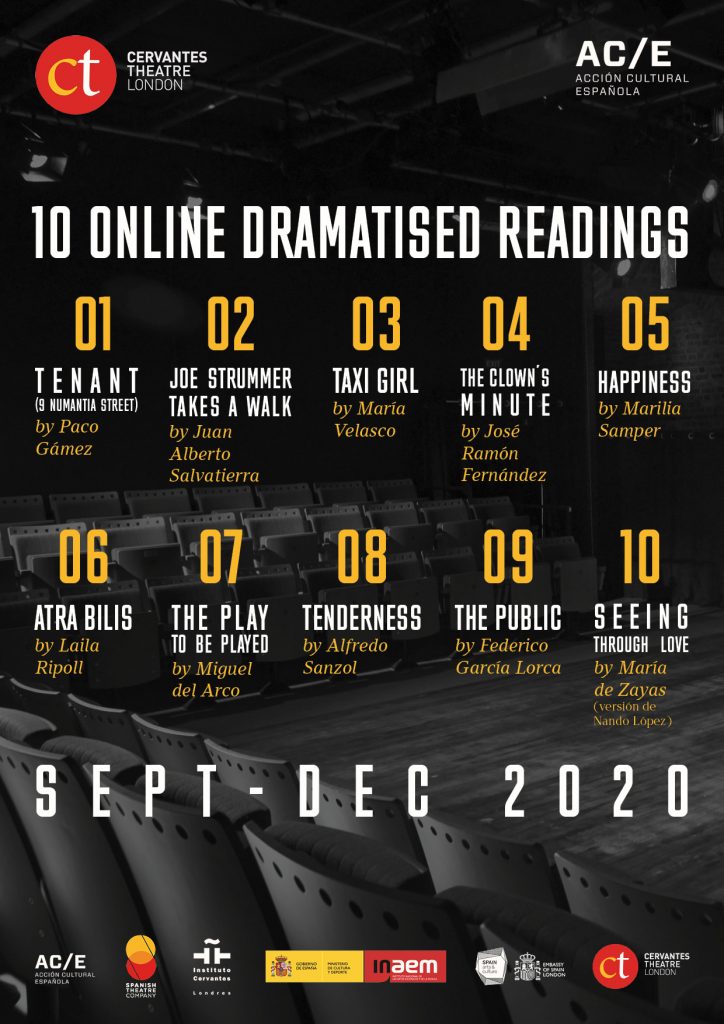
Este nuevo formato incorporará los ciclos ya consolidados:
IV Ciclo de NuevaDramaturgiaEspañola
III Ciclo de Teatro Español Contemporáneo
II Ciclo Aproximación al Teatro delSiglo de Oro español
y añadirá uno nuevo, el I Ciclo Aprendiendo de Nuestros Maestros.
“Necesitamos historias para aprender del pasado, entender el presente y construir el futuro. Este es un punto de inflexión en la historia y la cultura nos mantiene anclados cuando todo a nuestro alrededor se mueve, ilumina lo que tiene que ser visto y enciende la chispa de la imaginación para construir nuevos caminos. Queremos capturar abrir un espacio digital en el que podamos celebrar de nuevo la diversidad de culturas, idiomas e historias. El teatro une y queremos estar cerca de todos vosotros” añade Paula Paz, cofundadora y Directora Asociada del Cervantes Theatre.
LOS AUTORES OPINAN:
Juan Alberto Salvatierra
«Cuando escribí «El paseo de Joe Strummer» pensé que estaría de alguna manera incompleta hasta que esta no estuviese traducida al inglés. Que el Cervantes Theatre junto a AC/E hayan propiciado su traducción y lectura dramatizada significa para mí la conclusión de un proceso de creación”.
María Velasco
«Las traducciones hacen posible la migración de palabras y acciones. Tienen algo de equipaje delicado y de narcotráfico, como todo lo transfronterizo. Gracias, Teatro Cervantes, por hacer posible una de las pocas fugas que nos quedan. Gracias por hacernos viajar sin visado. La cultura activa siempre lucha contra las constricciones del espacio y del tiempo.»
José Ramón Fernández
«Soy fan del Cervantes Theatre desde que era un sueño en las cabezas de varios locos… Por eso me hace muy feliz saber que «El minuto del payaso» va a respirar en ese lugar, que es muy especial porque es un teatro y además un puente. En días como estos, es un modo de decirle a Londres “I can’t stop loving you”.»
Alfredo Sanzol
«Hoy en día hay mucha gente pensando en largarse a una isla solitaria. «La Ternura» también habla de eso, de las fantasías de soledad para huir de los problemas. Todo lo he contado imitando a las comedias del s.XVI y XVII las españolas, y las inglesas, así que espero que vaya muy bien en Londres. «
Miguel del Arco
«La función por hacer» marca un antes y después en mi carrera profesional. El año pasado celebramos el 10º aniversario de su estreno y volvimos a representarla en el teatro Pavón Kamikaze con el reparto original, pero a lo largo de estos 10 años no ha parado de representarse tanto en reposiciones varias, en Madrid, como en giras nacionales e internacionales. Así que la perspectiva de que se traduzca al ingles y se presente en el Cervantes Theatre de Londres, de la mano de Jorge de Juan, es una alegría enorme y una guinda más en este sabroso pastel que llevamos 10 años saboreando.»
Nando López
«Personalmente, iniciativas como esta me parecen doblemente valientes, ya que permiten acercar al público de hablan inglesa tanto las voces más relevantes de nuestra literatura clásica como la mirada singular que, sobre ella, intentamos aportar desde la dramaturgia contemporánea. «
Laila Ripoll.
«La traducción al inglés y difusión por medio de las lecturas en el Cervantes Theatre de mi obra supone un balón de oxígeno, un estímulo para seguir creando. Son muy pocas las oportunidades que tenemos los autores de dar a conocer nuestra obra fuera y si, además, es en un lugar tan importante y tan emblemático para el teatro, esas oportunidades se reducen.»
Paco Gámez.
«Estudié filología inglesa por amor a la literatura inglesa. Mi escritura bebe del teatro britanico (in-yer-face, Shakespeare…). Leer mis palabras en este idioma es una alegría y que el texto esté vinculado al Cervantes Theatre es un honor por la labor de difusión que están haciendo de la nueva dramaturgia española.»
Marilia Samper
Que “La alegría” sea leída en el Cervantes Theatre me llena de felicidad, no sólo por poder escuchar mis palabras en inglés y la posibilidad de que mi obra se difunda a nivel internacional, sino porque el teatro contemporáneo británico es y siempre ha sido mi mayor referente teatral. Que mi trabajo pueda verse, oírse, leerse en el seno del teatro que más admiro y con el que más me identifico es, sin lugar a dudas, un inmenso orgullo y un gran regalo.
IV CICLO DE NUEVA DRAMATURGIA ESPAÑOLA
1.- Inquilino (Numancia 9, 2º) de Paco Gámez, traducida por Tim Gutteridge (17 de septiembre)
2.- El paseo de Joe Strummer de Juan Alberto Salvatierra, traducida por L. Finch (24 de septiembre)
3.- Taxi Girl de María Velasco traducida por Jessica Rainey (1 de octubre)
4.- La alegría de Marilia Samper, traducida por Steven Capsuto (22 de octubre)
III CICLO DE TEATRO ESPAÑOL CONTEMPORÁNEO
5.- El minuto del payaso de José Ramón Fernández, traducida por Puerto Baker (8 de octubre)
6.- Atra Bilis de Laila Ripoll, traducida por Clare Nimmo (5 de noviembre)
7.- La función por hacer de Miguel del Arco, traducida por Simon Breden (12 de noviembre)
8.- La Ternura de Alfredo Sanzol, traducido por Simon Breden (19 de noviembre)
II CICLO APROXIMACIÓN AL SIGLO DE ORO ESPAÑOL
9.- Desengaños amorosos de Nando López sobre textos de María de Zayas traducida por Catherine Boyle (17 de diciembre)
I CICLO APRENDIENDO DE NUESTROS CLÁSICOS
10.- El Público de Lorca (3 de diciembre)
La Secretaria General del Cervantes firma un acuerdo con la Cámara de Comercio para impulsar el español en Reino Unido
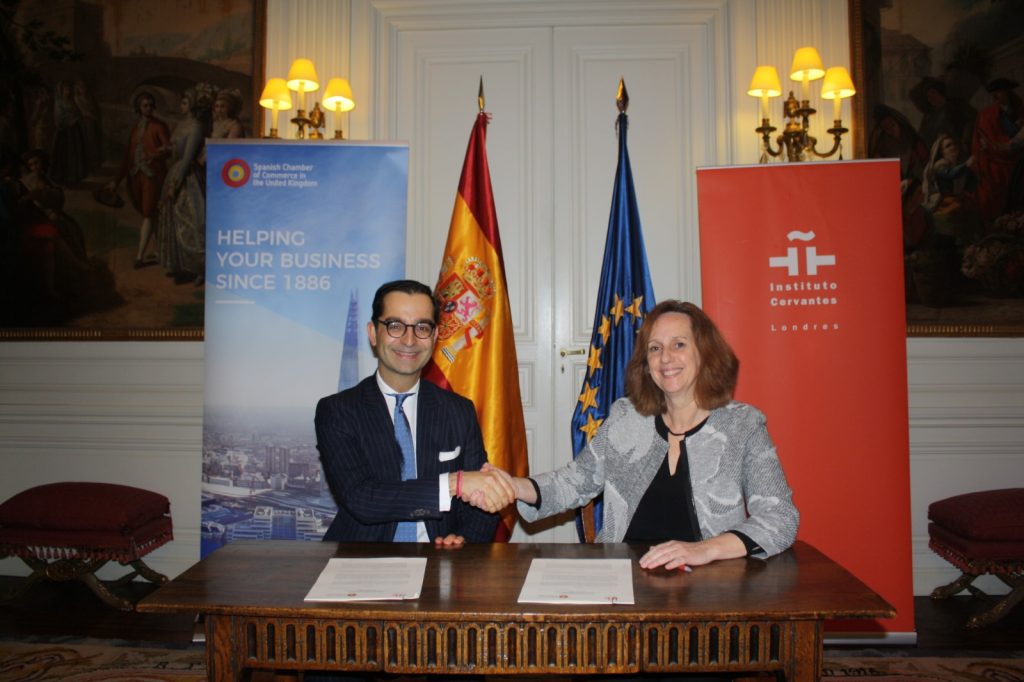
Tras la firma esta mañana del primer protocolo de cooperación entre el Instituto Cervantes y el British Council, la Secretaria General de la institución cultural española, Carmen Noguero, suscribió un acuerdo con la Cámara de Comercio de España en Reino Unido para el fomento de la lengua y cultura españolas. Asimismo, la ‘número dos’ del Cervantes presentó el anuario El español en el mundo 2019 ante embajadores, diplomáticos y académicos hispanoamericanos, por una parte, y ante profesores de español, hispanistas y gestores culturales, por otra.
La Secretaria General del Instituto Cervantes se trasladará mañana a la Universidad de Oxford, donde pondrá punto final a un viaje en el que le acompañan el director de Relaciones Internacionales del Instituto Cervantes, Rafael Soriano; el director del centro de Londres, Ignacio Peyró; y el director de los centros de Mánchester y Leeds, Francisco Oda.
Presentaciones del Anuario ante diplomáticos e hispanistas
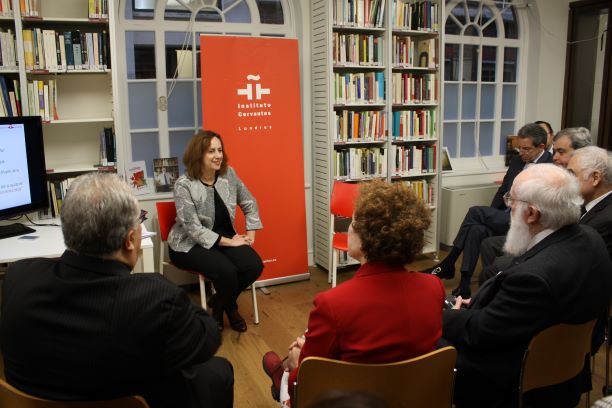
Noguero visitó el Instituto Cervantes en Londres, donde mantuvo una reunión con el personal de los centros de la institución en Reino Unido (Londres, Mánchester y Leeds), y conoció de primera mano la biblioteca y el archivo históricos del centro, notables, respectivamente, por su colección de libros de viajes por España y su documentación de la Guerra Civil.
Su primer acto público fue la presentación de la mayor publicación académica del Instituto Cervantes, el anuario El español en el mundo, en su edición de 2019, ante una nutrida delegación de diplomáticos y académicos hispanoamericanos. En el público estuvieron presentes los embajador de Honduras, Guatemala, Nicaragua, Paraguay, Ecuador, Panamá, Perú y El Salvador, además de Cristina Cortés, directora del think-tank de referencia en asuntos iberoamericanos, Canning House; y la directora de la oficina de la Universidad Autónoma de México en Londres, Ana Elena González, entre otras personalidades. Las distintas sedes del Instituto Cervantes cooperan en materia cultural de modo continuado con las Embajadas y consejerías culturales de los países hispanoamericanos.
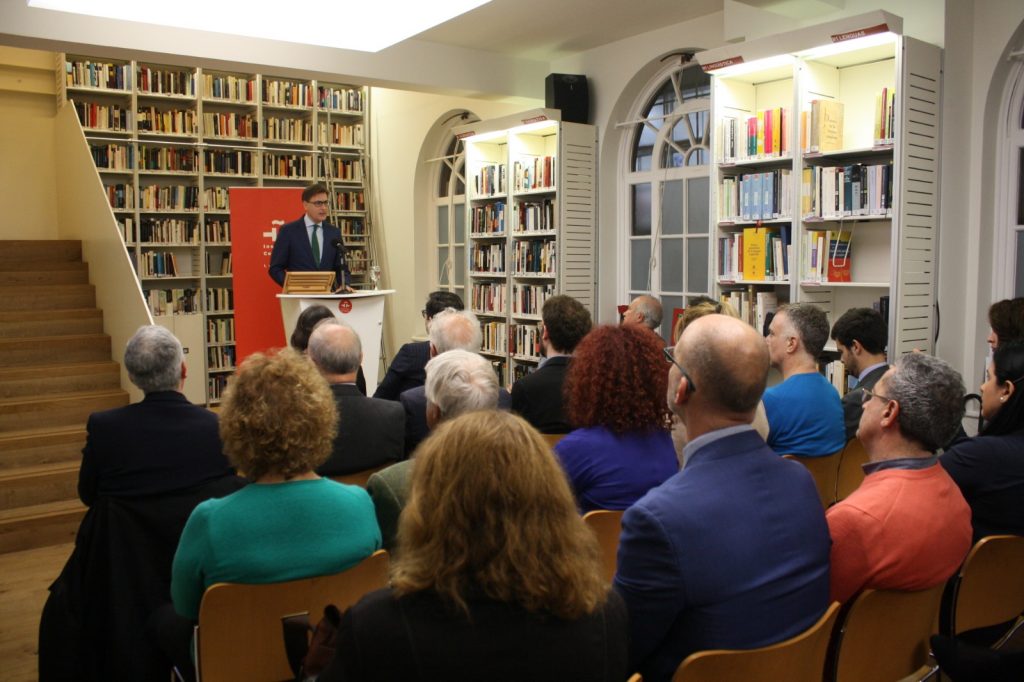
La Secretaria General también presentó su anuario en otro acto destinado a profesores de español en Reino Unido, hispanistas y gestores culturales. Entre los asistentes se pueden mencionar a profesores como Sir Barry Ife, Trevor Dadson, Catherine Davies o Sebastian Balfour, o el presidente de la asociación de docentes de español en Reino Unido (ELE-UK), Vicens Colomer.
El español en el mundo 2019 reúne datos actualizados y análisis en profundidad sobre la presencia e importancia de la lengua española a nivel global. En esta edición, el volumen destaca cifras significativas como los 580 millones de personas que hablan español en el mundo (el 7,6% de la población mundial). De ellas, 483 millones son hablantes nativos, lo que convierte al español en la segunda lengua materna del mundo por número de hablantes. Además, cerca de 22 millones de personas en 110 países lo estudian como lengua extranjera. El español es asimismo la tercera lengua más utilizada en internet, y el informe correspondiente a 2019 refleja, como dato novedoso, su crecimiento en Linkedin.
Firma de un acuerdo con la Cámara de Comercio española
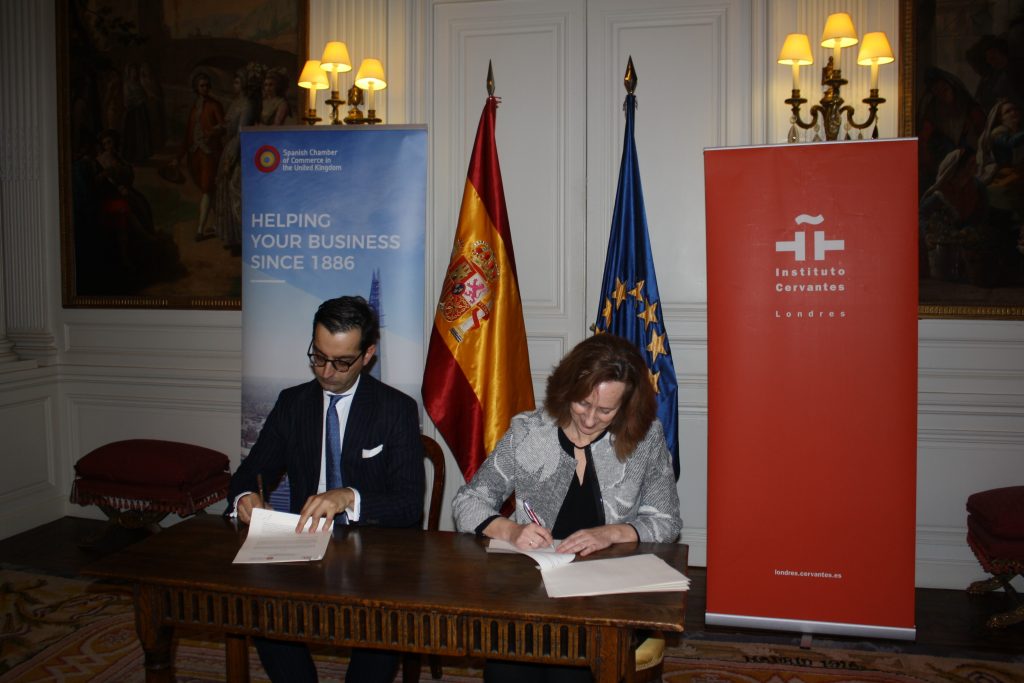
Junto al protocolo firmado con el British Council, el acuerdo suscrito con la Cámara Oficial de Comercio de España en el Reino Unido es uno de los puntos fuertes del viaje. El acto tuvo lugar en la residencia del embajador de España en Londres, Carlos Bastarreche, y contó como signatario por parte de la Cámara con su presidente, el abogado y solicitor Eduardo Barrachina, quien subrayó la importancia del acuerdo como “modelo de colaboración público-privada al servicio de la proyección de la cultura española”.
“La Cámara y sus empresas entienden muy bien que el español y la cultura española son fuente de riqueza. Este marco de colaboración garantiza que la cultura española tenga mayor proyección en el Reino Unido, y con esta firma, la Cámara y sus empresas reconocen el valor económico de la cultura española”, afirmó Barrachina.
En el acuerdo, el primero que firman ambas instituciones, se contemplan diversas acciones de promoción de la lengua y cultura españolas, en especial en el ámbito del español para los negocios. La Cámara aglutina a más de trescientas empresas españolas que operan en Reino Unido.
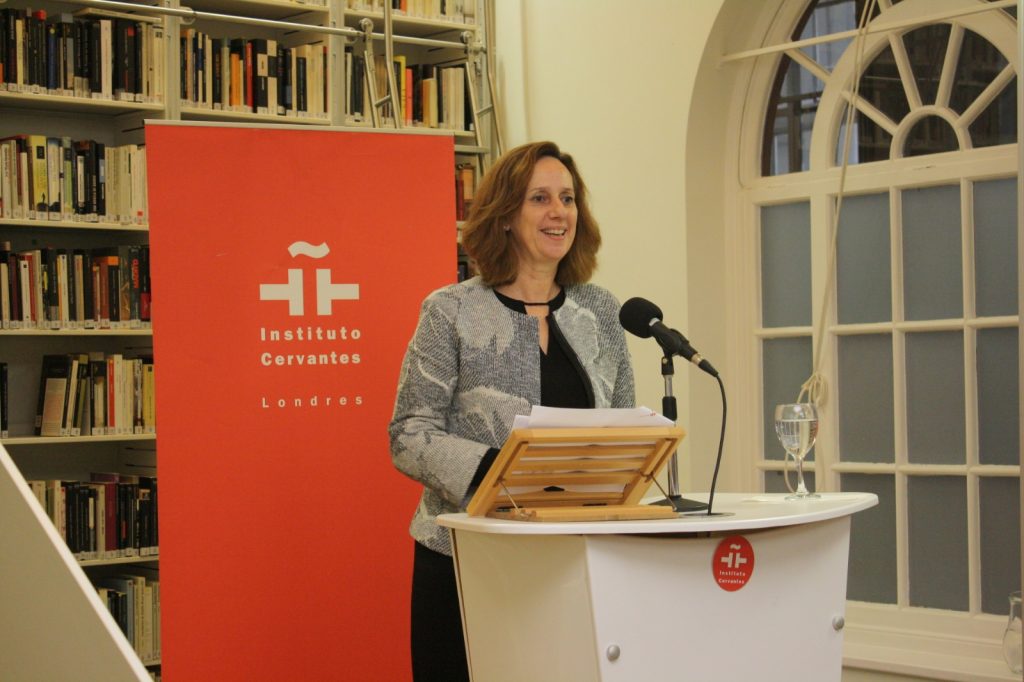
Encuentro con ejecutivos españoles de la City
Al terminar la tarde, Carmen Noguero asistió a la recepción de Navidad de la British Spanish Society, una organización benéfica fundada en 1916 y que promueve la amistad y el entendimiento entre británicos y españoles. Su día culminó con una cena, ofrecida por el restaurante Hispania, con representantes de la Cámara de Comercio y del mundo empresarial y financiero español en la City de Londres.
Visita a Sir John Elliott y a autoridades del hispanismo en Oxford
Mañana, la Secretaria General del Cervantes, como culminación de su viaje, se entrevistará con el gran hispanista y premio Príncipe de Asturias de Ciencias Sociales Sir John Elliott, en la ciudad de Oxford. Asimismo, mantendrá reuniones en Exeter College con las mayores autoridades académicas en hispanismo y docencia de la lengua de la célebre universidad, en concreto, el catedrático “Alfonso XIII” de Estudios Españoles, Jonathan Thacker, y el profesor titular y coordinador de español en la Facultad de Lenguas Medievales y Modernas, Javier Muñoz-Basols. Por último, Carmen Noguero asistirá en Magdalen College a un almuerzo ofrecido en su honor por el catedrático de literatura española Juan Carlos Conde, impulsor del Ciclo Madariaga de conferencias sobre temas españoles, con el que colabora el Instituto Cervantes.
Cinco cortometrajes gallegos de reciente creación protagonizan la undécima edición del Galician Film Forum en Londres

El Galician Film Forum (GFF) celebrará su undécima edición, titulada ‘Shorts Edition’, con un programa centrado en cortometrajes del audiovisual gallego que han visto la luz recientemente. La actividad tendrá lugar el viernes, 22 de noviembre, en la universidad King´s College London [19 h, Edmond J Safra Theatre, Strand Campus, WC2R 2LS]. Los títulos seleccionados para la ocasión son ‘A nena azul’ de Sandra Sánchez, ‘Marusía’ de Pedro Sancho, ‘Soy una tumba’ de Khris Cembe, ‘Limbo’ de Daniel Viqueira y ‘Beautiful Boy’ de Fran X. Rodríguez. Además, tras las proyecciones el público tendrá la oportunidad de mantener un coloquio con la directora y montadora Sandra Sánchez, que se desplazará a Londres para participar en esta edición.
Como es habitual, todas las cintas se proyectarán en versión original con subtítulos en inglés y el encuentro se celebrará en inglés y gallego. La entrada del evento es gratuita pero es preciso reservarla con antelación en el siguiente enlace. Esta undécima edición del GFF cuenta con el apoyo del Departament of Spanish, Portuguese and Latin American Studies del King´s College London, el patrocinio de ABANCA y la colaboración de la Oficina para Asuntos Culturales y Científicos de la Embajada de España en Londres.
El programa de esta Shorts Edition trae hasta Londres una selección de recientes cortometrajes gallegos que destaca por su diversidad de géneros. Con la ficción como hilo conductor, el público va a tener la oportunidad de visionar obras llenas de humor como “Beautiful Boy” o “Marusía”. También habrá espacio para la reflexión poética que planea en ‘A nena azul’ e, incluso, piezas de estilos poco habituales en el cortometraje gallego como la animación o el terror y de los que son buenos ejemplos “Soy una tumba” y “Limbo”, respectivamente.
Cortos multipremiados
Además de su carácter reciente, los títulos que se proyectarán en el Galician Film Forum comparten una exitosa trayectoria en festivales cinematográficos. En este sentido, hay que destacar la participación de ‘Limbo’ en más de un centenar de encuentros y que, por ahora, se ha traducido en una veintena de galardones entre los que destacan el de mejor cortometraje en el Grimmfest Manchester’s Festival of Fantastic Films; mejor director en el Cryptshow Festival; la Calaverita de Bronce en el Morbido Film Fest; el Premio Jurado Joven del Festival Ibérico de Cinema, el Mejor Cortometraje en Terroríficamente Cortos o el de Scariest Film en el Desmond District Demons, entre otros.
El éxito de ‘Soy una tumba’ también merece una mención especial ya que, además de poder presumir de haber sido nominado en la categoría de Mejor cortometraje de animación en los Premios Goya de este año, atesora un palmarés que no para de crecer a su paso por festivales. En ese listado destacan el de Mejor Cortometraje de Animación en los XVII Premios Mestre Mateo; Mejor Cortometraje de Animación en el Festival de Cortometrajes La Fila de Valladolid; Mejor Cortometraje Nacional en Cortoons Gandia 2019; Mejor Cortometraje Nacional y Mejor Cortometraje de Animación en el Festival Nacional de Ciudad de Ávila Ávilacine; Mejor Guion en Anima Deba Animazio Zinemaldia; el primer premio en el Ourense Film Festival; o el de mejor cortometraje de animación en el XX Festival de Cortometrajes Asier Errasti, por citar algunos.
Por su parte, ‘A nena azul’ aterriza en Londres con la Mención Especial del Jurado Planeta GZ y el Premio CREA a la mejor dirección Gallega XV del Curtocircuito International Film Festival (Santiago de Compostela); el Premio Mestre Mateo al Mejor Cortometraje en la XVII edición de estos galardones que concede la Academia Galega do Audiovisual; y los premios a la Mejor Fotografía y el Mejor Sonido en el VI Festival Nacional de Cortometrajes de Talavera de la Reina (Madrid).
En lo que respecta a ‘Beautiful Boy’, ha sido reconocido en varias ocasiones con el premio del público, como por ejemplo en el XVI Festival de Cans y en el Primavera do Cine, y también ha recibido galardones como el Premio al Mejor Guion de la Mostra de Curtas Vila de Noia. Para finalizar, ‘Marusía’, el cortometraje más reciente de los seleccionados, tuvo su premier internacional en el 8º Resistencia Film Festival de Chile y consiguió este octubre el Premio del Público al Mejor Cortometraje Gallego en la XLI Semana del Cine de Lugo.
Mirada atlántica
La invitada especial de esta edición del Galician Film Forum es la directora y montadora Sandra Sánchez. En el año 2011 presentó su proyecto más personal, el documental “Tralas luces”, una obra a la que dedicó cuatro años y que fue estrenada en la sección de nuevos directores del Festival de San Sebastián. Posteriormente continuó trabajando como montadora en series, documentales y películas como ‘Migas de pan’, ‘Esquece Monelos’, ‘Querida Gina’ o ‘Rafael’. También dirigió los cortometrajes ‘Matías’, dentro del encuentro de cineastas Chanfaina Lab, y ‘A nena azul’.
En la actualidad, Sandra Sánchez trabaja en el Laboratorio de Producción Audiovisual de los Museos Científicos Coruñeses y está escribiendo el guion del que será su primer largometraje de ficción, ‘La nadadora’, un proyecto íntimamente ligado a ‘A nena azul’, pues los dos films tienen la misma protagonista.
Galician Film Forum
El GFF nació en 2015 en el seno de un grupo de gallegos emigrados a Londres con el objetivo de crear un espacio para la difusión del cine gallego en la capital británica. Su actividad se articula en tres ejes: como plataforma de exhibición, como observatorio de la nueva diáspora creativa audiovisual en el Reino Unido y como espacio de reflexión sobre el cine y la cultura gallega en términos universales.
- Entradas: https://gffshortsedition.eventbrite.co.uk
- A nena azul: http://anenaazul.com/
- Limbo: https://www.facebook.com/curtametraxelimbo
- Soy una tumba: https://www.facebook.com/soyunatumba/
- Marusía: https://www.facebook.com/contarteproduce/
- Beautiful Boy: https://www.nenobonito.info/
Instituto Cervantes participates in The Language Show 2019 in London

Instituto Cervantes in London will participate in the Language Show on the 15-17th November. Hosted in London annually, it encourages learning and improvement across all global languages in colleges and universities, including range of official exams qualifications. There will also be cultural events held in celebration of nations across the United Kingdom.
«The Language Show is a unique opportunity to have direct contact with the language teaching offer available in the UK. To Instituto Cervantes in London, it is the best showcase to promote the center in the country,» underlines the head of studies at Instituto Cervantes in London, Pablo Martínez Gila.
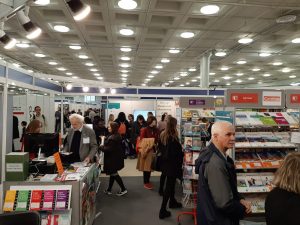
In addition, Martínez Gila highlights the high number of Spanish teachers who approach the stand to learn about the possibilities of training in Spanish as a Foreign Language (ELE), in order to update didactic, methodological and linguistic knowledge.
In its 31st edition, The Language Show is considered the largest language event in Europe, offering outstanding talks, classes and functions including over 100 exhibitors as well as test classes in 23 languages, free lectures and seminars.
The Cervantes Institute will have a joint stand with the Consejería de Educación and the Embassy of Spain in London, in which it will show the academic offer (classes and training), cultural centre and library.

The event takes place in the Olympia fairgrounds, and it’s an opportunity that cannot be missed for anyone learning or teaching a language. The wealth of resources on offer as well as help, advice, ways to learn and teach is unprecedented and, most importantly, will be an inspiration to all those who attend.
Get your free ticket to go to The Language Show here.
London pays a “restrained and exciting” tribute to Spanish exile at the tomb of Chaves Nogales

Instituo Cervantes in London paid tribute today to the memory of all Spanish exiles at the grave of exiled journalist and writer Manuel Chaves Nogales. The tribute took place in the North Sheen Cemetery in London and was chaired by the ambassador of Spain to the United Kingdom, Carlos Bastarreche.
It was also attended by one of the ten grandchildren of Chaves Nogales, Antony Jones, on behalf of Pilar Chaves (the eldest daughter and only survivor of the four children of Chaves Nogales), and other descendants of the famous Sevillian exile, as well as the writer Andrés Trapiello, among other names in the world of culture.
In the event, fragments of Chaves Nogales’ writing and various other texts written for the occasion were read. The act concluded with the placement of a crown of red flowers on the grave of the Sevillian writer and a minute of silence in memory of the Spanish exiles.
“The best values of our democratic Spain”
“The act has been very sober, as it should be, but it is a very exciting day for everyone. We have had the opportunity to honor an eminent exile such as Manuel Chaves Nogales, a voice of enormous moral weight in our convulsive S. XX, and with him all our exiles in the United Kingdom, ”says Ignacio Peyró, director of the Cervantes Institute in London .

This tribute is part of the monographic program Skies so unlike their own that pays tribute to the 80th anniversary of the Spanish Republican exile and is organised by the Instituto Cervantes in London, with the support of the Culture and Scientific Affairs and Education Office of the Embassy of Spain in the United Kingdom and the Commission for the Commemoration of the 80th Anniversary of Exile, among other Spanish and British institutions.
“Chaves Nogales embodies the best values of our democratic Spain. And that is why it is fair that, on the 80th anniversary of the Republican Exile, and on the 75th anniversary of his death, we have gathered at his grave to pay tribute to him and all the exiles,” said Ambassador Bastarreche in his speech.

Since the arrival of the theologian Antonio del Corro in the 16th century, London has welcomed numerous Spanish exiles. In the 19th century names like Agustín Argüelles, Espronceda or Alcalá Galiano arrived on English lands, and in the 20th century, with the Civil War, more would arrive who, according to Bastarreche, were “intellectuals such as Madariaga, Castillejo or Martínez Nadal, poets like Cernuda, publishers such as Joan Gili; Barcelona aviation pioneer Mari Pepa Colomer, or writers like Arturo Barea and Chaves Nogales himself.” That is the reason behind Instituto Cervantes in London’s decision to join the commemorations of exile that have also taken place in other cities such as Paris, Algiers or Moscow.
In fact, today’s event has continued the work carried out to commemorate the exile since 2018, including the delivery of the Arturo Barea archive to the Bodleian library in Oxford, the exhibition on Chaves Nogales organized at Europe House in February, the conference in homage to the so-called “Basque children” of 37 and the co-edition of the book Routes of Spanish exile in London.
Foreword of A sangre y fuego

Director of Cervantes Theater in London, Jorge de Juan, read in Spanish the prologue of the book A sangre y fuego by Chaves Nogales, while Candela Gómez translated into English. The stories that make up this book, written between 1936 and 1937, were initially published in several international journals, and portray different events of the Civil War that Chaves Nogales himself knew directly.
“Each of its episodes has been faithfully extracted from a true fact; each of his heroes has a real existence and an authentic personality ”, explains in the prologue of the book Chaves Nogales, who as director of the newspaper Ahora remained in Madrid from the beginning of the war until the end of 1936, when the government of the Republic moves to Valencia and he decides to go into exile. Chaves Nogales died in London in 1944 and he himself confessed before his death his regret of not seeing the end of World War II and the defeat of Nazism.
Defending democracy, truth and coexistence
«On behalf of his whole family, and particularly his daughter Pilar Chaves, it is exciting to participate in this tribute to all Spanish exiles and especially the great journalist and writer, our» pater families, «Manuel Chaves Nogales,» explained his grandson Antony Jones.

“Sometimes you might think that we are experiencing moments when propaganda, the use of labels or slogans, the decrease of democratic values and a lack of understanding that could even lead us to a democratic fracture of our European society. In an even more troubled and confronted era, Chaves Nogales continued his job of walking and counting fighting with the best weapons invented in the world, his pen and his typewriter, his lucidity, international vision and commitment to democracy and truth. A fight that brought him to this place but that, despite a small interruption of about fifty years, did not end here,” said his grandson.

Antony Jones stressed how his grandfather never wanted to be a protagonist, which is why this tribute would have made him feel “strange or even uncomfortable”, hence he sees it convenient to recapitulate from Chaves Nogales’ own book A sangre y fuego, how his commitment leads him to exile and death in the United Kingdom: “My only and humble truth was an insurmountable hatred of stupidity and cruelty (…) idiots and murderers have been produced and acted with identical profusion and intensity on both sides that left Spain (…) I left, when I had the intimate conviction that everything was lost (…) I wanted to allow myself the luxury of not having any solidarity with the murderers. For a Spaniard, this may be an excessive luxury. It pays dearly, of course. ”
“At his grave, with the best possible gravestone and the one that reflects his trade of walking and telling, his own work, I think it is a good time, on behalf of all those who have paid dearly, to remember everything that unites us and commit ourselves again to defend democracy, truth and coexistence,” added Antony Jones.
Removing Chaves Nogales from oblivion

At the event, the writer Andrés Trapiello read a text written for the occasion. In his opinion, “no Spanish writer has been more a victim of both sides of the divided Spain than Manuel Chaves Nogales. He lost the war and lost the literature manuals at the same time. These two Spains almost managed to silence their writings forever, those precisely denouncing the horror of totalitarianism, communism and fascism, which were about to destroy Europe in the most devastating war in the history of Humanity, initiated precisely in Spain with the War Cruel civilian of the many that Spain had known until then”.
For Trapiello, the lucidity with which Chaves Nogales denounced the danger and told the facts of which he witnessed in the first months of the Spanish war, “condemned him for almost seventy years to ostracism, but the awakening of an immense majority of readers belonging Spain has taken a silent and silenced third Spain from oblivion and today Chaves Nogales is perhaps the most incontestable and happy literary resurrection in the recent history of literature.”
The writer defended the homage of a “brave man, committed to the truth and the facts at a time when postmodern totalitarianism, populism and nationalism attempted to destroy Europe again and coexistence between free citizens and the same, that is, what made Chaves leave Spain and come to meet his death so far from his land.”
«We film little, and in these times, it is also a declaration of principles»
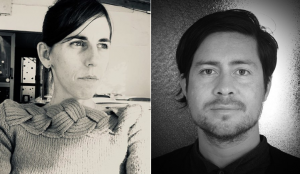
We interview filmmakers Teresa Arredondo and Carlos Vásquez Méndez after the premiere of their movie The Crosses at Open City Documentary Festival in London. Arredondo is a psychologist and filmmaker, her work in cinema revolves around the autobiographical. Her first work is a portrait of the last years of her grandmother, writer Matilde Ladrón de Guevara. Her first feature film, Sibila, received numerous awards at festivals around the world. She is a FIDOCS programmer and is co-founder of the Laguna Negra studio with Vásquez, with whom she develops different experimental and essay documentary film projects.
In the case of Vásquez, he is an artist and researcher. He uses cinema and photography from documentaries and an experimental perspective, establishing constant correspondences between artistic practice, social sciences, analog and digital. His works have been exhibited in various exhibitions and festivals. In 2016 his film [Pewen] Araucaria received the Joris Ivens / Center National des Artes Plastiques (France). With a bachelor of Cinema, a Master of Creation Documentary (IDEC / UPF) and a Master of Contemporary Artistic Creation (UB), he is currently developing his doctoral research.
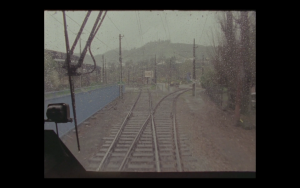
1. What does it mean for you to present Las Cruces in London?
It is our premiere in the UK, it is always interesting to hear the opinions of audiences other than Chilean and Latin American, who unfortunately share a dark part of our recent past and take the history of the film to our particular territories. That is why it is important to contrast the universality of this story about these heinous crimes, which although it arose in a particular context, speak of the banality of evil, about the economic sector as the factual power, about how the official history is written from the spheres of power.
2. What was the reception like in the United Kingdom?
In the Bertha DocHouse room all tickets were sold, we were surprised by the response of the London audience.
3. Las Cruces was recorded in 16mm, why this format?
We work in 16mm because we both learned cinema at film school – we understand cinema in this format and we are still trying to remain faithful to this material. More than a fascination for the plastic characteristics of the film image, we are interested in the methodology involved, the material is expensive, scarce and delicate, it forces us to prepare a lot every shot, rehearse, be very concentrated, film little. And in these times, it is also a declaration of principles: let’s say it is a conscious position as opposed to the banalization of images in the era of social networks.
4. Why did you decide to make this documentary?
This case has several peculiarities with respect to the totality of crimes of the dictatorship. The first is the participation of private in the crimes, the second is that there are confessions of the perpetrators, the third is the time that justice has been taken in issuing a sentence and this is a very symptomatic detail of the symbolic relevance of this case. Because it would be the first time that a company of a powerful family is imputed as a direct accomplice of crimes of disappearance and murder of Chilean citizens for their political ideas.
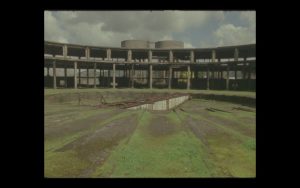
5. What was the response among the relatives of the 19 murdered?
They always agreed with the project, although we gave voice to the testimonies of the murderers instead of theirs. From the beginning they understood the central idea of the film and collaborated in every world without impositions or any conditions. They helped in the election of the inhabitants of the town who read the judicial documents, since the only condition we put to the relatives was that we did not want to expose them or submit them for reading in front of the camera. Our intention was to take care of them, work alongside them, not use their suffering.
6. What are you working on now?
The next thing is an exhibition in Port Bou at the end of September around the figure of Walter Benjamin and his tragic death. I have prepared a film piece – experimental medium-length film – about his trip through the Eastern Pyrenees before his life was taken away. With Teresa, the co-director of Las Cruces, we are working on three new projects together. The new pieces focus on the treaties on colonial history in Chile, from Spanish colonization to the planned colonization of citizens of northern Europe in the 19th century and the current post and neo-colonization of the most peripheral provinces. We have a studio called Laguna Negra, after Las Cruces, we really want to get a new movie together soon, hopefully we’ll have something next year.
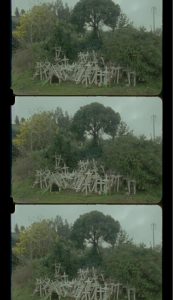
Instituto Cervantes in London launches the Diploma of Teaching Accreditation (DADIC)
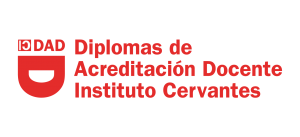 For the first time, Instituto Cervantes in London will host the course to obtain the Diploma of Teaching Accreditation of Instituto Cervantes (DADIC) in October. This is an introductory teaching course aimed at people without previous experience or training in language teaching.
For the first time, Instituto Cervantes in London will host the course to obtain the Diploma of Teaching Accreditation of Instituto Cervantes (DADIC) in October. This is an introductory teaching course aimed at people without previous experience or training in language teaching.
This 140-hour course will have a 50% practical component and 50% theory. The course covers the first stage of development, including teaching competence and preparation for the teaching accreditation of Instituto Cervantes.
Institute Cervantes is undertaking the training of future teachers of Spanish through the Diploma of Teaching Accreditation. It’s the first of a series of diplomas that will accredit the different levels of pedagogical aptitude in the field of Spanish as a foreign language. To access the Diploma, teachers can take a course (which will be offered at the Institute’s headquarters in Alcalá de Henares, Madrid and in the Institute’s centers worldwide) or assessment tests are also available, dependent on the student’s level and experience.
The DADIC course is based primarily on teaching practices (class observation, teaching simulations, classes taught with real students at Instituto Cervantes, among others). It also involves reflection on these practices as tools to build the necessary knowledge to successfully and autonomously face the work of a Spanish teacher.
«Instituto Cervantes has undertaken the work of unifying the training of Spanish teachers of the future, and has begun to do so through the Diploma of Teaching Accreditation (Autonomous level), the first in a series of diplomas that will accredit different levels of pedagogical aptitude in the field of Spanish as a foreign language. To access the Diploma, teachers can take a course (which will be offered at the headquarters of the Institute in Alcalá de Henares and in the centers of the Institute in the world) or, if their training and experience a series of evaluation tests allows it,» explains Pablo Martínez Gila, head of studies at the Cervantes Institute in London.
Martínez emphasizes how the course to obtain the DADIC diploma will be based primarily on teaching practices (class observation, teaching simulations, classes taught with real students at Instituto Cervantes in London, etc.) and on the reflection on these practices as tools to go building the knowledge necessary to successfully and autonomously face the work of the Spanish teacher for foreigners.
For more information, visit our website
London celebrates the new translation of Rubén Darío’s poetry by Hispanic Feinstein
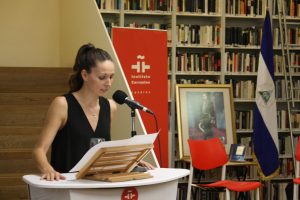
The bilingual poetry recital, organized by Instituto Cervantes in London, was supported by the Embassy of Nicaragua and the presence of Spanish-American ambassadors
Instituto Cervantes in London organised a poetry reading of the work of Nicaraguan poet Rubén Darío by the renowned hispanist Adam Feinstein, in an event that was also the pre-launch for his new book, “Found in Translation: New Versions of Rubén Darío”. The event was supported by the Embassy of Nicaragua.
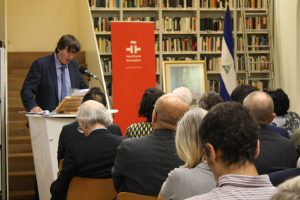
The conference was attended by the Ambassador of Nicaragua in the United Kingdom, Guisell Morales Echaverry; the director of Instituto Cervantes in London, Ignacio Peyró; actress María Estévez-Serrano, who recited Darío’s verses in Spanish; as well as the ambassador of Cuba in the United Kingdom, Teresita de Jesus Vicente Sotolongo; and the Guatemalan ambassador to the United Kingdom, Acisclo Valladares Molina.
Morales Echaverry thanked Feinstein’s work and effort to bring Darío’s work into the language of Shakespeare. Furthermore, the director of Instituto Cervantes in London highlighted Darío as one of the most important poets of Spanish language. He also celebrated Feinstein’s “great” work in “translating his [Dario’s] unique rhythm and language.»
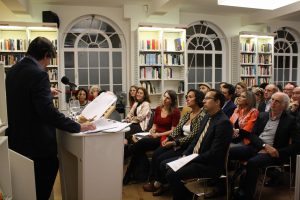
Along the same lines, Feinstein highlighted the importance of the Nicaraguan poet and read a selection of his poems’ translations into English. His new work will be a bilingual edition of different works of poetry from all stages of Darío’s life, which will be published in Nicaragua and the United Kingdom in early 2020. “I was lucky to be in Nicaragua in February this year, and the influence of Rubén Darío is lived in all parts of the country, as well as throughout the Spanish-speaking world,” said Feinstein.
Feinstein, born in Cambridge, published the acclaimed biography, “Pablo Neruda: A passion for life,” that was published by Bloomsbury in 2004. He also wrote the introduction to the English edition of Jorge Luis Borges’ Labyrinths ( The Folio Society, 2007).
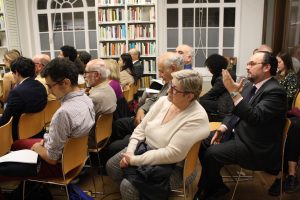
Learn how to prepare an Asturian fabada bean stew with Hispania
Hispania’s premises, with more than 9,000 square feet are part of the ground floor of the historical building of Lloyds Bank. Hispania is located at 72-74 Lombard Street, one of the most emblematic streets of London, across Bank Underground Station, in the heart of the City.
With two floors dedicated to show the best of Spain, Hispania is the largest, most accomplished and ambitious project devoted to Spanish gastronomy in Europe And with almost 50 meters of facade and 8.5 meters total height, Hispania holds a license to operate as a restaurant, bar, shop and take-away.
Almost 9,000 square feet of space make Hispania a proper flagship store of Spanish cuisine, food and culture.
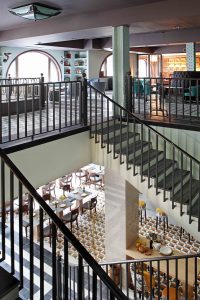
Hispania in London
Designed by the renowned interior designer and antique dealer Lorenzo Castillo and under the gastronomic coordination of award-winning chef Marcos Moran, Hispania is the latest great culinary sensation, offering the best experience of Spanish lifestyle, gastronomy, and culture in London. The prominent architect Tommy Tait, who also designed the well-known Selfridges department store, planned the building where Hispania’s premises are located. In 2007, the building went through a full refurbishment valued at more than 65 million pounds, being converted into premium office space.
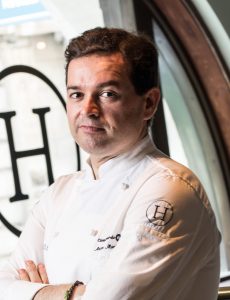
Award-winning chef Marcos Moran
Fabada de Prendes, for 4 people
Ingredients:
500 kg of dried beans or 1 kg of fresh beans (in this case there is no soaking)
2 Asturian black pudding
2 Asturian chorizos
1/4 of a saffron sachet
A small piece of unsalted bacon
60cl of oil
1 teaspoon chopped onion
Salt to taste
¼ teaspoon sweet paprika
200cl of chicken broth
1 small piece of pork
METHOD:
- Soak the beans in cold water the night before you plan to make your fabada.
- First, cook the chorizos, bacon and black pudding in water (just enough to cover them in the pan) for 10 minutes to degrease them.
- Now, in a separate pan, bring the beans to a slow boil and scoop out the foam that starts to form on top of the water. Boil for approximately 20 minutes.
- Add the oil, chopped onion and sweet paprika to the pan with the beans.
- Next, add a little water to the saffron to make a little broth and then tip this into the fabada also.
- Season the beans with salt and pepper then, turn off the heat and let the beans rest.
- Turn the heat back to low and cook slowly for an hour and a half, making sure to top up the broth they’re cooked in so that they don’t boil dry.
- The fabada will be ready when the beans are still holding their shape but soft enough that they taste creamy and delicate.
PRESENTATION
Traditionally, we present the beans and the meat separately.
The broth must be somewhat thick; if it is very liquid, it is advisable to pass some beans through a sieve and incorporate them into the pot to thicken the broth.

Asturian fabada bean stew


